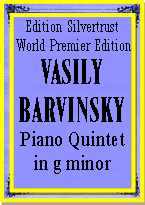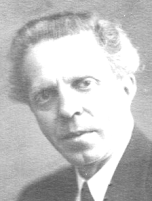Presents
Vasily Barvinsky
 |
 |
Piano Quintet in g minor-World Premier Edition
We are pleased to present the Piano Quintet in g minor by the Ukrainian composer Vasily (Vasyl) Barvinsky (1888-1963). He was born in the Ukrainian city of Ternopil (then known as Tarnopol and part of the Austrian-Habsburg Empire). He studied piano, and composition at the Lyiv Conservatory and afterward in Prague with Vizeslav Novak. He pursued a career as a composer and teacher, eventually becoming a professor at the Lyiv Conservatory. His music, occasionally shows the influence of Impressionism, but often relies on Ukrainian folk melodies. Minimalism also attracted him. He was not a prolific composer and chamber music is not a large part of his oeuvre.
Thanks to the Stalinist regime Barvinsky was arrested sentenced to ten years of imprisonment in 1948. He was forced to sign a document agreeing to the destruction of his manuscripts most of which were subsequently destroyed. Upon his release in 1958, he spent the rest of his life trying to reconstruct the works which had been destroyed or lost. His Piano Quintet in g minor was among these. Barvinsky reconstructed the first movement and was working on the second movement at the time of his death and hence the Quintet should probably be considered incomplete. It is thought to have been composed sometime around 1912 and was one of several works dedicated to the memory of Mikola Lysenko (1942-1912), who is generally considered the father Ukrainian music and the founder of what became the Kyiv Conservatory. It is written in the late romantic style.
The substantial first movement is in several sections. It begins with a slow, elegiac, almost funereal introduction marked Grave, quasi sospirando. (somber almost sighing) and is played by the strings alone. It sounds folkloric. this theme is repeated in all of the sections but treated very differently each time. When the piano enters, the tempo and mood suddenly change to an Allegro non troppo ed inquieto. The music is restless and turbulent but at times becomes calmer. The second section alternates between powerful statements by the piano and less thrusting and more lyrical replies by the strings. In the concluding section, the strings take the lead in presenting a diffident but at times very lyrical set of melodies. The second movement, Largo sostenuto, such as it is, begins the way the first movement did, with the strings alone playing. It seems unlikely that this is all Barvinsky intended to write. It is far more likely that he either did not have the chance to complete the movement or could not remember what came next. Once again, the music is elegiac and funereal and the original theme can be heard in extended form. A suitable tribute or memorial to a great man.
The score to the quintet was
published after Barvinsky's death as part of a series of his collective works.
It was based on the manuscript that he had reconstructed. The parts created from
this score and were edited by senior editors Garik Hayrapetyan and
Raymond Silvertrust. In our opinion, this is a superb work, beautiful and full
of emotion. We warmly recommend it for concert performance and also to amateur
ensembles as it Presents
no great techical callenges.
Parts: $39.95